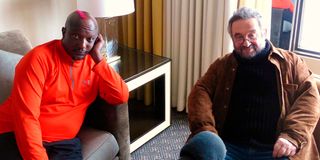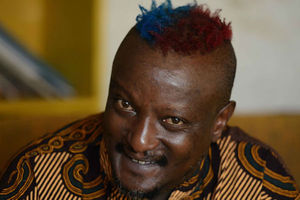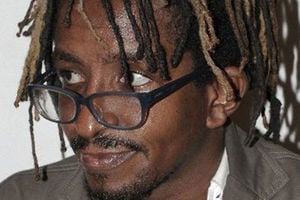
Professor Mikhail Iossel (right) of Concordia University with the late writer Binyavanga Wainaina at a past SLS event.
Nairobi, of the last quarter a century, is one of the noisiest cities in the world – even when you turn down the volume on the Gen Z protests of the last few weeks; it is also one of the continent’s most dynamic cities today, the hubbub of everything with Western zeitgeist, a hypermodern metropolis, pulsing non-stop with generations-worth of pent-up angry and hungry energy, but also the funny and funky vibe you find in our “X” social media to art, books, culture and music.
It is into this accidental city of urban sprawl, modern 25-storey buildings eating up the trees to accidental, unplanned ‘constructions’ as you leave the centre, to slums and ghettos, that literature Professor Mikhail Iossel of Concordia University has re-returned, a quarter a century after he first set foot in Kenya with a dozen of his students from New York.
Three years later in 2002, with Mwai Kibaki just about to come to power, and the country throbbing with literary energy and euphoria, Mikhail Iossel, started a literary collaboration between his ‘Summer Literary Seminars’ and the Kwani? Journal, headed by the late Binyavanga Wainaina, that would see at least a dozen Kenyan writers visit Russia (for literature) over the next decade; and tens of (mostly) North American writers (George Saunders) and editors (Deborah Treisman, New Yorker) and publishers (Fiona McCrae, Gray Wolf) come to Kenya.
SLS’s successor, the International Literary Seminars (ILS) is now underway in Lamu with about a dozen poets, writers and academics from both North America and Kenya for the next week, and then for some ends in a writing retreat in the Masai Mara until the end of the month.
Literary program
Who is this Prof Mikhail Iossel, whom in a literary program unique in the world, managed/ manages to triangulate creative workshops, across quarter a century, from Eastern Europe to East Africa to North America?
Mikhail Iosse was born in the mid-1950s into the Union of Soviet Socialist Republics (USSR) in St. Petersburg (then called Leningrad), in a city he describes thus in his essay ‘The Unfinished City.’
“St. Petersburg is, all in all, a timeless and dignified place. It is not what one would call an open city: it won’t greet you with open arms, slap you on the shoulder, tell you to feel right at home. It is an inordinately beautiful city, perhaps the most beautiful in the world — but not necessarily a very lovely one. The aloof brilliance of its aspect can render one speechless initially, but not set one’s heart aglow with warmth. One may recall how, in Chekhov’s “Gooseberries,” the two rain-soaked travellers walk into Alyokhin’s estate’s main building and are met there by the maid, “a young woman so beautiful that they both stood still and looked at one another.” St. Petersburg is like that young woman.”
There was not too much by the way of aesthetics in the communal apartment into which Mikhail was born though: “We lived with three other families in this cramped flat - one toilet, one bathtub, one kitchen, one little table, one burner cooker, and zero fridge, which meant ‘perishables’ were stored somewhere between the ceiling (which meant these communal flats constantly smelled of stale cabbage and harsh disinfectants).”
Even today, a comfortably off Professor Iossel, as we sit watching some Woody Allen movie, looks up from his wine and sighs at some scene, and wryly says: “Rich New Yorkers right there, with their twenty room apartments …”
Younger brother
Eventually, when he was 8, and with a younger brother long having come along, they were moved to their own apartment by the State – not because of the extra addition to the family, but because his father was fast proving himself as one of the most brilliant submarine electromagnetic scientists in the USSR, “working in a secret research institute, guarded by a bunch of hungry Caucasus-mountain dogs.”
Brilliant in literature from the Tenth Grade, but with there being no pathway for Jews into the Arts’ fields in the Soviet of that time, young Mikhail eventually followed his father into the career of electro-magnetic engineering via way of the Leningrad Shipbuilding Institute in 1978, but not before a strange soccer incident.
In 1965, Soviet clubs were allowed for the first time into the ‘Euro’ club competitions, and 10 years later, Dynamo Kiev won the continental competition.
A football mad Misha was just about “good enough” to be called up by some local club in his region for trials, but on “D-Day”, his mother locked him up all day in his bedroom. “She is the one who got me all the books as a boy that I learned to love, standing in the snow before book-rationed bookstores opened, to buy me books.”
Prof Mikhail smiles, shrugs: “I was no Shevchenko! If not for my mom on that, and maybe many other days, today I would be the third-rate coach of a fourth-rate football team in Chutokha, trying to train fifth rate players to get into the sixth tier of the Rossiyskaya Premyer Liga.”
His mother passed away last month.
Today, Mikhail Iossel is a distinguished professor of English at the top Concordia University in Montreal, Canada, teaching top tier students about the anatomy and memory of story, sentence structure and such-like within MFAs (Gladwell Pamba, in 2023, and Gloriah Amondi, an ILS fiction fellowship awardee this year, got full scholarships, but the professor is seeking funding to get more East African talents)
“Because I only wrote in Russian until I was thirty,” says this remarkable man, who left the USSR for America in 1986, but three years later was on English scholarship in New Hampshire, and in another decade would be teaching creative writing, “I do not approach texts in a hurry, and can often see in sentences things many native speakers of the language cannot see.”
In that way, I think Professor Iossel is an engineer of English.
In real life, back at the start of the 1980s, he became a ‘refusenik’, refusing to follow the submarine wave that both his father and the State wanted him to – and the latter rapidly torpedoed the young 25 year old engineer’s life – forcing him to work odd jobs to make ends meet in his beloved literary city of Leningrad (it returned to being called ‘St. Petersburg’ only ten years later after the USSR fell).
For example, as Mikhail writes in the opening paragraph of his short story “The Night Andropov Died,” it was an evening like many others, “and I was sitting with the dedicated drunks Lyokha and Olezhek, two of my fellow security guards at the Krestovsky Island Amusement Sector of the Leningrad Central Park of Culture and Leisure, finishing the last of three bottles of toxic ersatz port on a plywood table.”
Luckily, he had more salubrious friends (as opposed to those toxic colleagues) at the samizdat – underground writers (and readers of illegal Western literature) – which the KGB kept a careful eye on, even as they denied Iossel and many other refuseniks permission to leave the USSR, for an eternal five years of despair.
Sixty dollars
Then Mikhail Gorbachev came into power in 1985, with his policies of glasnost (openness) and perestroika (transparency), and decided to let “refuseniks” emigrate out of Russia, in order to improve his relationships with the West.
“So, one day, I get this call from a KGB official, and he goes ‘Iossel, you have 24 days to get out of this country!’, and hang up.”
Mikhail Iossel did, arriving in the USA with sixty dollars in his pocket, and hope in his heart that “basically vanished within 24 hours as I came to the realization that I wouldn’t be able to make a living writing in Russian, in my new home, the USA.”
Three suicidally miserable years followed, with Mikhail lonely and lost, working in local bookshops, getting fired, once sleeping on the streets, before going to live with distant relatives in San Francisco as he learned English (in short sentences) that eventually got so good he won a Guggenheim scholarship to university.
“I’m a survivor,” Iossel, who is Jewish says, sipping wine. “You just have to be!”
He is also a person of great personal kindness, who is always seeking to do to others what he did by himself – ‘rescue’ great literary talents from places of statis (and Gen Zees certainly think Kenya currently is, as quips Qwani’s Keith Agana).
From the turnpike of the millennium, the Summer Literary Seminars (SLS) did 10 years of mid-year literary programs in St Peterburg, Russia, five of those coming concurrently in December to Kenya (2002, 2005, 2006, 2008 and 2010), before in the next decade having one in Canada, six in Lithuania and the last three in Tbilisi.
Then along came Covid-19, in the Year 2020, and the clock stopped.
Now with the torch passed onto Carrie Lynn Hatland’s capable hands, with the International Literary Seminars, the trans-continental creative writing torch once more burns over the placid waters of Lamu, in 2024, with a whole new generation
Nostradamus’s last (SLS) words: ‘Tomorrow, I shall no longer be here.’
Peter Abelard (playing ILS): I don’t know.
Tony Mochama is a poet, novelist and the Sec. Gen of PEN International (Kenya). [email protected]







